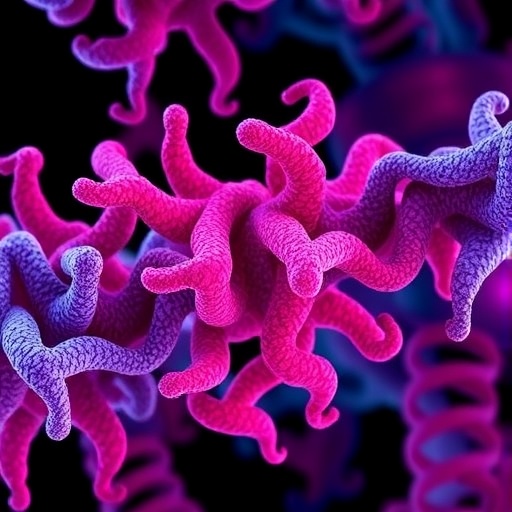Recent research led by Tono et al. sheds light on the complex interplay between chromatin remodeling and cancer with a specific focus on abnormalities associated with the SWI/SNF complex, particularly the SMARCA4 gene. This study is crucial as it tackles the challenging domain of cancers of undetermined primary origin, a category often fraught with diagnostic and therapeutic uncertainties. The research dives deep into the genetic and clinicopathological landscapes of these cancers, providing a comprehensive analysis that could inform future therapeutic strategies.
Chromatin remodeling is an intricate process that plays a vital role in modulating gene expression. This regulation is particularly significant in cancer, where dysregulation of chromatin remodeling factors can lead to tumorigenesis. The SWI/SNF complex is one of the key players in chromatin remodeling, and its dysfunction is linked to various malignancies. Among its components, SMARCA4, also known as BRG1, has emerged as a pivotal factor whose mutations are frequently observed in a range of cancers, suggesting its critical role in maintaining chromatin integrity and, consequently, normal cellular functions.
In analyzing the clinicopathological characteristics associated with SWI/SNF deficiencies, the researchers examined various samples from patients diagnosed with cancers of unknown primary. These cancers are particularly challenging because they do not have an identifiable origin, complicating treatment approaches and prognostication. By focusing on the SMARCA4 gene, the authors aimed to elucidate the frequency and implications of SMARCA4 mutations within this patient cohort, diving into the molecular mechanisms that may underpin the pathology of these tumors.
The researchers employed a robust genomic analysis methodology, enabling them to identify not only point mutations but also larger chromosomal aberrations that could affect the SMARCA4 gene and potentially other components of the SWI/SNF complex. Such a comprehensive approach is necessary because alterations in chromatin remodeling can have cascading effects on gene expression networks. Moreover, understanding these alterations can aid in identifying potential therapeutic targets or biomarkers for the diagnosis and treatment of cancers of unknown primary.
The findings from Tono et al. reveal a concerning trend: a significant portion of the samples exhibited aberrations in the SWI/SNF complex, highlighting the importance of chromatin remodeling in these cancer subtypes. This points to a broader implication that clinicians and researchers should be mindful of when assessing patients presenting with cancers of unknown primary. The presence of SMARCA4 mutations could serve as a valuable diagnostic marker or a therapeutic target, steering treatment approaches toward more personalized medicine strategies.
In addition to identifying mutations, the study also delves into the functional implications of these abnormalities, specifically how they contribute to the aggressiveness of tumors. The authors underline that understanding the role of SMARCA4 could provide insights not only into cancer biology but also into potential therapeutic responses. Targeting the SWI/SNF complex might offer new avenues for drug development, especially in treatment-resistant cancers that exhibit chromatin remodeling anomalies.
Furthermore, the research establishes a clear connection between the presence of SWI/SNF deficiencies and poor clinical outcomes in patients. This correlation emphasizes the need for routine testing for SMARCA4 mutations in patients diagnosed with cancers of unknown primary, as it could significantly influence treatment decisions and inform prognostic assessments. The implications of such findings extend beyond immediate clinical applications, hinting at the potential for developing novel therapeutic strategies aimed directly at chromatin remodeling pathways.
As the body of research surrounding chromatin remodeling in cancer continues to grow, findings such as those presented by Tono et al. pave the way for enhanced understanding and innovative intervention strategies. The complexity of cancer as a disease necessitates an equally comprehensive approach to research; thus, studies focused on genomic and clinicopathological analyses will become increasingly essential in uncovering the myriad ways in which chromatin modifications can drive oncogenesis.
In conclusion, the exploration of SWI/SNF chromatin remodeling abnormalities, particularly in the context of the SMARCA4 gene, represents a significant advancement in our understanding of cancers of unknown primary. Tono et al.’s work illustrates the potential benefits of genomic analyses in unraveling the complexities of cancer pathology and highlights the significance of chromatin remodeling in the ongoing fight against malignancies. As scientists and clinicians alike strive for improved diagnostic and therapeutic modalities, incorporating insights from such cutting-edge research will be crucial.
This integral work opens up vital pathways for future research endeavors, especially in targeted therapy development and precision medicine approaches tailored for patients suffering from elusive cancers where conventional therapeutic methodologies have failed. Ultimately, by forging connections between chromatin remodeling and cancer outcomes, this research not only contributes to the existing scientific literature but also sets a foundation for innovative treatment paradigms that could reshape clinical practice in oncology.
Subject of Research: SWI/SNF chromatin remodeling abnormalities in cancers of unknown primary, focusing on SMARCA4 gene mutations.
Article Title: Clinicopathological and genomic analysis of SWI/SNF chromatin remodeling abnormalities with a focus on SMARCA4 in cancer of unknown primary.
Article References:
Tono, Y., Sukeno, K., Tsunoda, A. et al. Clinicopathological and genomic analysis of SWI/SNF chromatin remodeling abnormalities with a focus on SMARCA4 in cancer of unknown primary.
J Cancer Res Clin Oncol 151, 238 (2025). https://doi.org/10.1007/s00432-025-06293-9
Image Credits: AI Generated
DOI: 10.1007/s00432-025-06293-9
Keywords: Chromatin remodeling, SWI/SNF complex, SMARCA4, cancer of unknown primary, genomic analysis, clinicopathological characteristics, targeted therapy, oncology.




